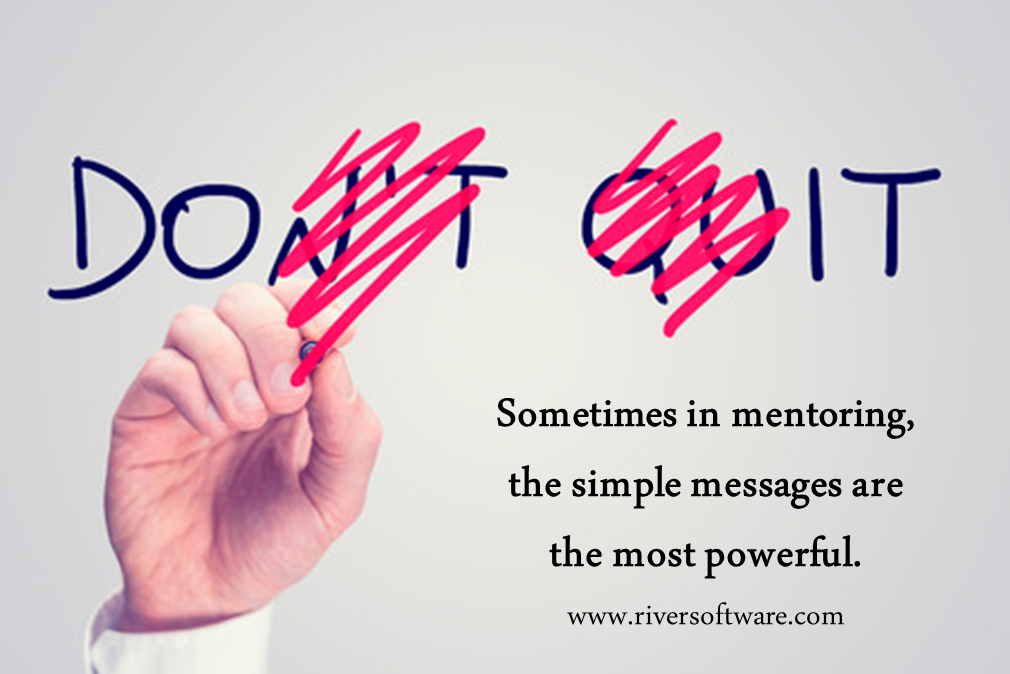Quick Tips to Get Started as a Mentor
 Most people feel it is a great privilege to be asked to be someone’s mentor, a sentiment I agree with wholeheartedly. It can also be a little humbling and overwhelming at times to be looked upon as someone who might have the answers to a mentee’s problems. Mentoring is all about sharing what you know and talking through personal and professional development issues with the mentee. The fact that someone has asked you to be their mentor says a lot about you already—you must be doing something they like, since they want to learn from you!
Most people feel it is a great privilege to be asked to be someone’s mentor, a sentiment I agree with wholeheartedly. It can also be a little humbling and overwhelming at times to be looked upon as someone who might have the answers to a mentee’s problems. Mentoring is all about sharing what you know and talking through personal and professional development issues with the mentee. The fact that someone has asked you to be their mentor says a lot about you already—you must be doing something they like, since they want to learn from you!
Here are four easy tips to remember to help you on your path to excellence as a mentor.
Embrace Your Role as a Mentor
Mentors are as diverse as the global population. A mentor might be older than a mentee, or they could be younger. They could be from the same socioeconomic background, or from a different background completely. They could be the same gender, race, ethnicity…or not. They could hold a similar job to the mentee, or be on a completely different career path.
The point here is that mentors can be anyone. Your role as a mentor is simply to be the person in the relationship who has more experience and wisdom on a certain subject, and therefore is the one who can share their insights and knowledge with the mentee. You can make this role uniquely your own by embracing your position as a mentor. Look upon yourself as someone who has something important to share with your mentee, who has experience and know-how that the mentee has specifically sought out. You are a guide who can share examples of what worked in the past, what didn’t work (which is as equally important to discuss), why various things matter in different situations, etc.
Don’t be afraid to view yourself as the expert. You may not know everything about the subject areas that the mentee is interested in discussing and developing, but you have insights that the mentee can use. They wouldn’t have sought you out otherwise! Be open and generous with sharing your knowledge with your mentee, and believe in yourself as a mentor.
 Engage Your Mentee in Conversation
Engage Your Mentee in Conversation
The biggest part of mentoring relationships is mentoring conversations. Dialogue between you and your mentee forms the core of your relationship. This is how information is shared, how questions are asked, and how development occurs. As the mentor, it is imperative that you engage your mentee in conversations that dig into their issues and provide opportunities for open, honest, and unbiased dialogue.
One of the easiest traps to fall into as a mentor is talking too much. You may think that it is your duty as a mentor to share every last nugget of information about a topic that you can, but this misses the ultimate point of mentoring—helping the mentee develop. Sharing a story or explaining a theory can be helpful, but you have to remember that conversations should involve both of you talking and both of you listening.
Good conversations are a balancing act of asking and telling. Don’t get sucked into the trap of telling too much and not asking enough. Getting your mentee to talk will allow you to hear their point of view and let you hear them express their situation in their own words. This can provide a wealth of information for you if you listen carefully enough. Use what the mentee tells you as a way to dig into areas for growth and development. Remember, the goal is to help the mentee develop, so let them do most of the talking. (Check out our “Three Factors for Better Communication in Mentoring” blog for more information on this topic.)
 Encourage Your Mentee
Encourage Your Mentee
Mentors are often viewed as a sounding board for the mentee…and for good reason. As the mentor, you should encourage your mentee to speak honestly about their ideas, dreams, goals, difficulties, shortcomings, and achievements. Help them see the value in their triumphs and their struggles. Be there to engage your mentee in meaningful conversation that digs into the heart of the issue at hand. Be the person they can turn to when they need a quick confidence boost or a frank assessment of a situation.
A good mentor is a good cheerleader and coach. This doesn’t mean that you should give false or overly effusive praise to your mentee (unless the latter is warranted), but it means that you should support them and encourage them as they pursue their goals. Real and honest feedback can be one of the best ways to encourage your mentee—even if the feedback might be hard for the mentee to hear. Give them a sense of where they might be falling short in achieving their goals, but be sure to couple that with conversations and ideas on how they can address these shortcomings.
Kim Scott has written a book called Radical Candor, a concept that could work well here. She describes radical candor as when you care personally and challenge directly. “Radical Candor really just means saying what you think while also giving a damn about the person you’re saying it to.” That’s good mentoring if I’ve ever heard it.
Evolve and Grow
This last tip is as much for mentors as it is for mentees. We should all strive to evolve and grow as individuals, mentoring partners, coworkers, and so on. Mentors can encourage their mentees to evolve and grow by using effective dialogue methods and pushing them to look deeper into their actions and motivations. Use probing questions to dig into what the mentee is telling you, and then use this information to help guide the mentee on a path of self-discovery.
When you focus on the growth and development of your mentee, you give yourself opportunities to grow and evolve as a mentor as well. Your dialogue style, listening skills, creativity, empathy, and much more can be impacted. Mentors often say they get as much from the mentoring relationship as their mentee does, and this is a big reason why. We never stop learning. Be cognizant of how you are performing as a mentor and make a conscious decision to improve in areas that need attention. If you are so inclined, you could even search for a mentor to help you on these areas.
Some of our clients offer mentoring groups for mentors to help them develop their mentoring skills. River also offers mentor certification and training to help support mentors in their role. Contact us to discuss our mentoring software, services, training, and expertise that can help you get the most from mentoring.








